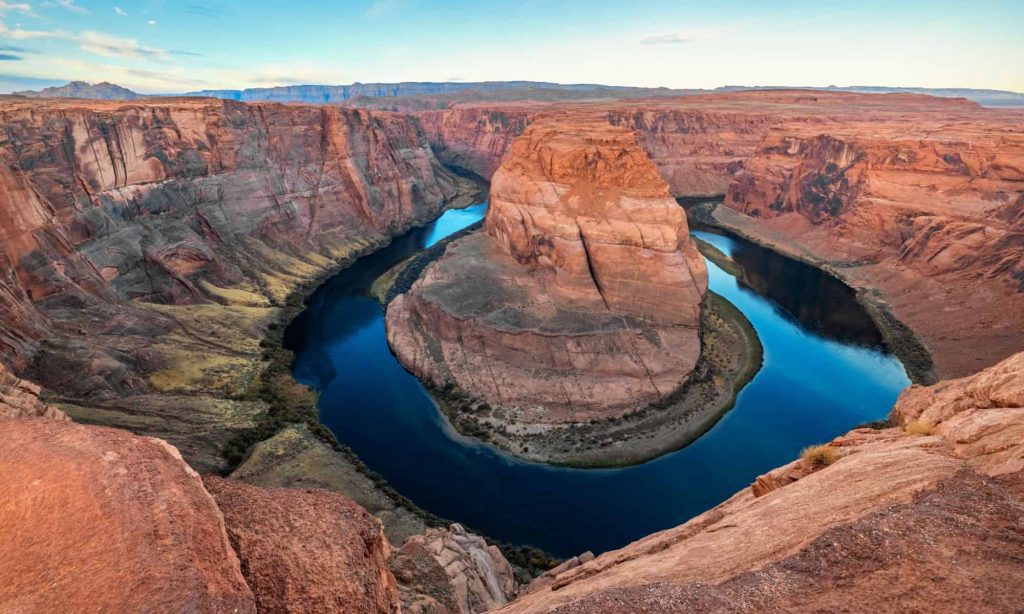Wall Street investors have a growing interest in the Colorado River’s fate, and with the federal government poised to force Western states to change how they manage the alarming shortfall in water, this may be news to some.
CBS News and The Weather Channel found that private investment firms are getting more and more interested in the Colorado River’s water, which is a scarce natural resource in the American West. This level of interest is worrisome for some river-dependent communities, including agricultural ones.


“The river is our only source of water in Colorado,” says Joe Bernal, who farms land throughout Colorado’s Grand Valley despite the river’s depletion due to drought.
He states, “That river is all we have.”
Bernal was born and raised in the Grand Valley, where his family first settled nearly a century ago.
He used to live alone, but in 2017 an investment firm based out of New York called Water Asset Management bought a farm in the valley that Bernal now rents from and helps run.
By all accounts, the New York City-based hedge fund has spent at least $20 million on land in the Grand Valley over the past five years, making it one of the region’s most prolific landowners.
The hedge fund, which has been around since 2005, claims to only put its money into businesses and properties that protect the safety and quality of the water supply. Its current president and co-founder, Matthew Diserio, referred to the water industry in the United States as “a trillion-dollar market opportunity” in 2021.
Bernal says he had doubts when he first heard about the company.
“What if I had invited them here? No.” To quote Bernal: “Do I feel good that a large corporation is investing in our valley’s real estate market the way we do? Really, it doesn’t.”
Colorado River Water Conservation District General Manager Andy Mueller says the company likely has no concrete plans for the property.
Mueller attributes the issue to the water.
“These are people who see the drought as a business opportunity,” he explained.
Mueller is responsible for safeguarding Colorado’s portion of the river, which provides drinking water to numerous cities across seven states, including Denver, Salt Lake City, Albuquerque, and Los Angeles. According to him, Water Asset Management is keen on the water rights that come with their purchase of over 2,500 acres of farmland.
I think these drought capitalists are vultures,” Mueller said. “The goal is to make a fortune off of this public amenity. Colorado water, Western water, is the key to your future. There is no hope for a future without water.”
CBS News’ requests for interviews with Water Asset Management were not granted. When interviewed by Fintech TV three years ago, the company’s president, Diserio, explained that one of his firm’s strategies is to profit from water by improving the efficiency of the farms it buys and then selling parts of its water rights to other farmers and cities increasingly desperate for the natural resource.
The former head of Colorado’s water department has been hired by Water Asset Management as an attorney.
In the words of the company’s website, “scarce clean water is the resource defining this century, much like plentiful oil defined the last.”
Several factors are contributing to the scarcity of potable water.
According to The Weather Channel’s storm expert Greg Postel, “The Colorado River relies primarily on snowpack in the Rocky Mountains that feeds into the river as it melts in the spring and summer.” “However, the west is becoming hotter and drier due to global warming. The river’s flow has decreased by about 5% for every degree of warming, which amounts to a nearly 20% decrease over the past century.”
Not only that, but we’ve been experiencing the worst megadrought in 1,200 years, and it’s been going on for the past 23 years. It’s not just Western countries that use it excessively; everyone does.
Postel states that this has had a devastating effect on the nation’s largest reservoirs. “Both Arizona’s Lake Powell and Nevada’s Lake Mead are at all-time low levels. They’re only using a quarter of their total potential. Many people in the West are worried that their access to this vital resource is about to be disrupted by a major crisis.”
Former Colorado state senator and rancher Kerry Donovan is one of many who share this concern. Concerns her a lot that investors are buying up land in her state to get water rights.
As in, “You do realize that scarcity increases value, right?” That’s what Donovan explains.
Unfortunately, Donovan’s efforts to strengthen Colorado’s anti-speculation laws were unsuccessful.
She speculated on the ways in which businessmen could benefit from the state’s water rights.
She predicts financial success for the group because “the state will be forced to create a system that doesn’t exist right now to allow more flexibility in how a water right is used,” which would otherwise be impossible.
Denver, Las Vegas, Phoenix, and Los Angeles are among the cities in the arid West that rely on the federal government to keep their water running.
To encourage farmers to leave their land fallow and conserve water, Congress has approved spending $4 billion on drought relief. Colorado is one of a number of Western states that are thinking about giving farmers money to leave their fields empty.
The future of Bernal, meanwhile, is intertwined with that of Water Asset Management and his new New York City landlords.
Bernal comments, “They’ve put money into the properties by installing new irrigation systems.” That’s good news so far.
However, Bernal assured me that he is paying attention.
“Good land stewards and water rights stewards will have their eyes open,” Bernal says. We’re going to be on the lookout for potential threats.




